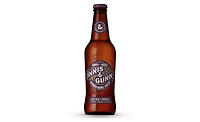BountyBev benefits from compact distribution operations
Craft beer wholesaler’s nimble operations benefit customers

Over the past decade and a half, the craft explosion has forced distributors to develop entirely new skill sets to manage the vast array of new products — many of which require special handling to ensure quality isn’t compromised. To keep pace, many large wholesalers have launched specialty divisions that specifically deal with craft SKUs that demand more TLC.
But the modern market dynamic also has created the opportunity for small, boutique start-up distributors for which craft is their entire raison d’etre. Among those is BountyBev, an eight-year-old operation that delivers a growing number of craft beer brands throughout eight counties in the greater Nashville, Tenn., area.
When BountyBev launched in 2010, it consisted, essentially, of founder Kurt Strickmaker and a single truck. Today, the company employs nearly 30 vehicles with a fleet of box trucks, side-loaders and cargo vans specifically curated for the demands of craft SKUs and the accounts that carry them.
Still, even with its expanding ranks and vehicle inventory, BountyBev is miniscule when compared with most mainstream, large and midsize distributors. And that comes with its own share of challenges — as well as advantages.
“Obviously, we don’t have the Buds, Millers or Coors of the world to keep the lights on and beer doesn’t necessarily just fall off our truck,” Strickmaker says. “At times, a drop may only have two cases, we might lose money on that drop, but we’ve got to do it to keep relationships and build relationships. And, one day, we may have four cases there, instead of two there.”
Despite the lack of macro-brands, BountyBev still has some large-volume, fast-moving craft players in its portfolio — particularly Bell’s and Founders — that represent much of the company’s bread and butter and take up the majority of space on the truck. About 80 percent of the company’s business comes from its top eight accounts. But there still are greater per-case margins to be had from those slower-moving one-offs and ensuring they’re delivered as efficiently as possible, making day-to-day loading and delivery an ongoing puzzle.
“We do have to be efficient with our drops and our geography,” Strickmaker explains. “It’s important for us to make sure not to run across town for one sixtel [keg] if we can help it, but at the same time we will lose money on a delivery to gain a tap handle, from which we’ll hopefully gain great dividends.”
One element that enables BountyBev’s drivers to be a bit more nimble on the road is the fact that the warehouse crew doesn’t do night loading. “The drivers come in in the morning and load their own trucks,” Strickmaker says. “They pick their own products and stage the loads related to the stops on their routes. That way they know where everything is on his or her own truck, which gives them some efficiency when they arrive at their accounts.”
The company relies heavily on box trucks — one of which is refrigerated — but it does deploy two side-loaders for convenience and grocery accounts.
One of the benefits of the BountyBev fleet’s compact size, Strickmaker says, is that it enables the company to quickly respond to spur-of-the-moment customer demands. “Because we’re so swift to react, we’re really good at hot-shots,” he explains.
The fleet includes a pair of vans dedicated to that specific purpose. “We have dedicated delivery routes, but if an account runs out of beer we do have a flex guy who can make those hot-shot deliveries, which gives us an advantages,” Strickmaker adds. “If they call, we can get beer to the account the morning of.”
It also helps that, from a mileage standpoint, most of the accounts are within a manageable radius from the BountyBev headquarters. That’s especially helpful from a climate control standpoint. A number of craft beer styles are temperature-sensitive and while the BountyBev fleet does include one refrigerated vehicle, most of the products are delivered at ambient temperatures.
“We don’t spend a lot of time driving all over creation and we tend to deliver everything under 70 degrees,” he says. “We have product stored at 60 degrees and obviously draft is stored at 40 degrees. Draft is definitely arriving cold. We care a great deal about the quality of our beer and we wish we could have every truck as a reefer. But on some days we notice we don’t even need to run the reefer — it’s a judgment call at that point. It is very cost-prohibitive to run reefers all over town.”
On Mondays, the slowest delivery days, BountyBev will schedule pickups at local breweries that don’t ship their products. Drivers looking to pick up some extra hours also will perform maintenance on the vehicles on the down days. “They’re making sure every vehicle is logged so they know, ‘oh next week, we’ve got to do an oil change,’” Strickmaker says. “It’s keeping people on site, keeping people employed.”
The regular maintenance has benefited the equipment. “One thing we’ve noticed is that the last couple of years the trucks have been a lot more efficient delivering and not spending time in the shop,” he says. BI
Looking for a reprint of this article?
From high-res PDFs to custom plaques, order your copy today!





